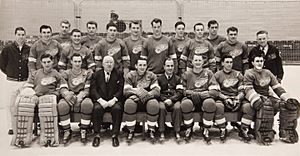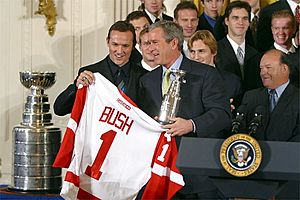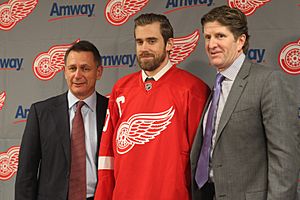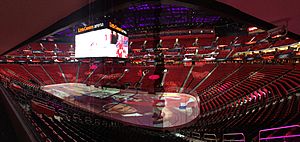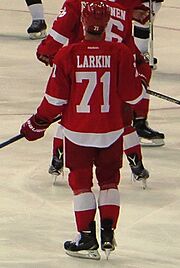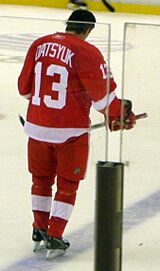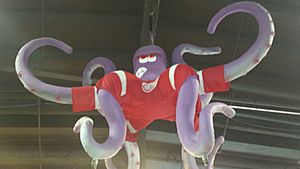Detroit Red Wings facts for kids
Quick facts for kids Detroit Red Wings |
|
|---|---|
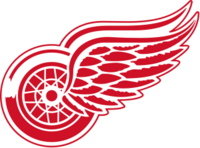 |
|
| Conference | Eastern |
| Division | Atlantic |
| Founded | 1926 |
| History | Detroit Cougars 1926–1930 Detroit Falcons 1930–1932 Detroit Red Wings 1932–present |
| Home arena | Little Caesars Arena |
| City | Detroit, Michigan |
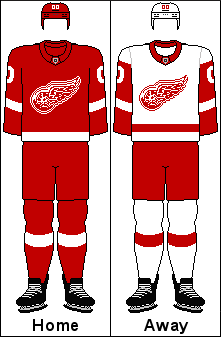 |
|
| Colors | Red, white |
| Media | FanDuel Sports Network Detroit 97.1 The Ticket |
| Owner(s) | Ilitch Holdings, Inc. |
| General manager | Steve Yzerman |
| Head coach | Todd McLellan |
| Captain | Dylan Larkin |
| Minor league affiliates | Grand Rapids Griffins (AHL) Toledo Walleye (ECHL) |
| Stanley Cups | 11 (1935–36, 1936–37, 1942–43, 1949–50, 1951–52, 1953–54, 1954–55, 1996–97, 1997–98, 2001–02, 2007–08) |
| Conference championships | 6 (1994–95, 1996–97, 1997–98, 2001–02, 2007–08, 2008–09) |
| Presidents' Trophies | 6 (1994–95, 1995–96, 2001–02, 2003–04, 2005–06, 2007–08) |
| Division championships | 19 (1933–34, 1935–36, 1936–37, 1987–88, 1988–89, 1991–92, 1993–94, 1994–95, 1995–96, 1998–99, 2000–01, 2001–02, 2002–03, 2003–04, 2005–06, 2006–07, 2007–08, 2008–09, 2010–11) |
The Detroit Red Wings are a professional ice hockey team from Detroit, Michigan. They play in the National Hockey League (NHL) as part of the Atlantic Division in the Eastern Conference. The Red Wings are one of the "Original Six" teams, which means they are one of the six oldest teams in the NHL.
The team started in 1926 as the Detroit Cougars. They changed their name to the Detroit Falcons in 1930. Finally, in 1932, they became the Detroit Red Wings.
The Red Wings have won the Stanley Cup 11 times. This is the most championships for any NHL team based in the United States. Only the Montreal Canadiens (24) and Toronto Maple Leafs (13) have won more overall. The team played at Joe Louis Arena from 1979 to 2017. Before that, they played at Olympia Stadium for 52 years. Since the 2017–18 season, their home arena is Little Caesars Arena.
Detroit is often called "Hockeytown" because the Red Wings are so popular and successful. This nickname has been a registered trademark since 1996. The Red Wings had an amazing streak of making the playoffs for 25 seasons in a row, from 1990–91 to 2015–16. This was one of the longest playoff streaks in NHL history.
Contents
- Team History
- Team Information
- Broadcasters
- Season-by-Season Record
- Players and Personnel
- Franchise Records
- Images for kids
- See also
Team History
Early Years and Name Changes (1926–1949)
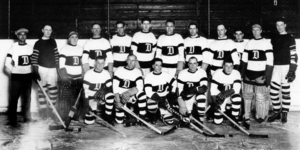
The Detroit franchise joined the NHL in 1926. They bought players from the Victoria Cougars, a team that had won the Stanley Cup. Because of this, the new Detroit team was named the Detroit Cougars.
Since Detroit didn't have an arena ready, the Cougars played their first season in Windsor, Ontario. For the 1927–28 season, they moved into the new Detroit Olympia. This arena was their home until 1979. Jack Adams became their coach and later their general manager. He was a very important person for the team for 36 years.
The Cougars made the playoffs for the first time in 1929. In 1930, the team changed its name to the Falcons. They still struggled, often finishing near the bottom of the standings.
In 1932, a businessman named James E. Norris bought the Falcons. He decided to rename the team. Norris had been part of a sports club that used a "winged-wheel" emblem. He thought a red version of this logo would be perfect for a team in "Motor City" (Detroit). So, on October 5, 1932, the team became the Detroit Red Wings.
The Red Wings won their first playoff series in 1933. In 1934, they reached the Stanley Cup Final for the first time but lost to the Chicago Black Hawks. Two seasons later, in 1936, the Red Wings won their first Stanley Cup. They won again in 1937.
In the early 1940s, the Red Wings reached the Stanley Cup Finals three years in a row. They lost in 1941 and 1942. But in 1943, Detroit won their third Stanley Cup.
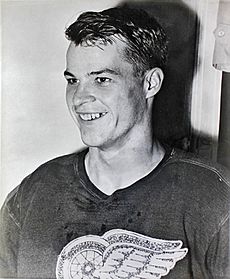
In 1946, one of hockey's greatest players, Gordie Howe, joined the Red Wings. By his second season, Howe played with Sid Abel and Ted Lindsay. They formed a famous line called the "Production Line."
The Gordie Howe Era (1950–1966)
In the 1950 Stanley Cup Finals, the Red Wings beat the New York Rangers in seven games. This was their fourth Stanley Cup.
Detroit won its fifth Stanley Cup in 1952. They swept both the Maple Leafs and the Canadiens in the playoffs. The "Production Line" was strong, along with new goalie Terry Sawchuk. Detroit was the first team in 17 years to go undefeated in the playoffs.
In 1952, James E. Norris passed away. His daughter, Marguerite, became the team president. She was the first woman to lead an NHL team.
The Red Wings won two more Stanley Cups in a row, beating the Montreal Canadiens in both 1954 and 1955. Both series went to seven games. These wins were exciting and showed the team's strength.
After 1955, Marguerite Norris was replaced by her younger brother, Bruce. The Red Wings and Canadiens met again in the 1956 Stanley Cup Final, but this time Montreal won. In 1957, Ted Lindsay helped start the National Hockey League Players' Association (NHLPA), a union for players. After this, he was traded to Chicago.
In 1959, the Red Wings missed the playoffs for the first time in 21 years. However, they soon became strong again. They reached the Finals in four of the next six years but did not win another Cup during this period.
"Dead Wings" Era (1967–1982)
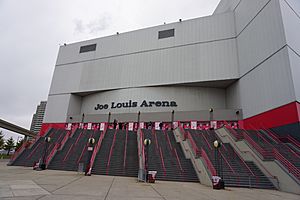
After 1966, the Red Wings entered a long period of struggle, sometimes called the "Dead Wings" era. They missed the playoffs for many years.
On December 27, 1979, the Red Wings moved to a new home, Joe Louis Arena. They had played at Olympia since 1927. In 1982, after 50 years of his family owning the team, Bruce Norris sold the Red Wings to Mike Ilitch. Ilitch was the founder of the pizza chain Little Caesars.
The Steve Yzerman Era (1983–2006)
In 1983, the Red Wings drafted Steve Yzerman. He was a talented center who quickly became a star. In his first year, Detroit made the playoffs for the first time in six years.
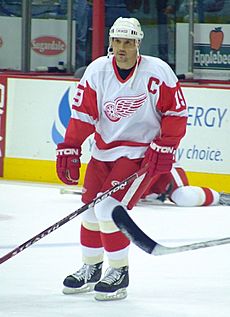
In the 1986–87 season, Yzerman became the team captain. With new coach Jacques Demers, the Red Wings started winning again. They reached the conference finals twice but lost to the Edmonton Oilers.
In 1989, Yzerman scored a career-high 65 goals. The team continued to improve. In the early 1990s, players like Sergei Fedorov, Nicklas Lidstrom, Vladimir Konstantinov, Vyacheslav Kozlov, Darren McCarty, and Chris Osgood joined the team.
The Russian Five and Back-to-Back Stanley Cups (1994–1998)
In 1993, Scotty Bowman became the new head coach. In the 1994–95 season, he led Detroit to their first Finals appearance in 29 years, but they lost.
During the 1995–96 season, the Red Wings won an NHL record 62 games. However, they lost in the conference finals.
The next season, the Red Wings added Brendan Shanahan and Larry Murphy. In the playoffs, they were very strong. They swept the Philadelphia Flyers in the Finals to win their first Stanley Cup since 1955. This ended a 42-year championship drought. Goalie Mike Vernon was named the playoff MVP.
Six days after their championship, defenseman Vladimir Konstantinov suffered a serious brain injury in a car accident. His career ended suddenly. The team dedicated the 1997–98 season to him. The Red Wings won the Stanley Cup again, sweeping the Washington Capitals. Konstantinov was brought onto the ice in his wheelchair to touch the Cup. This was a very emotional moment.
More Success and New Stars (1999–2006)
The Red Wings continued to be a top team. They acquired star players like Chris Chelios in 1999. In 2001, they were upset in the playoffs.
During the next off-season, the team added goalie Dominik Hasek, and forwards Luc Robitaille and Brett Hull. Young stars like Pavel Datsyuk also joined. These additions made the Red Wings very strong. They had the best record in the 2001–02 regular season.
Detroit won another Stanley Cup in 2002, beating the Carolina Hurricanes. Nicklas Lidstrom was named the playoff MVP. Coach Scotty Bowman and goalie Dominik Hasek both retired after this win.
In the 2003–04 season, Hasek returned from retirement. The Red Wings finished first in the NHL standings. They won their first playoff series but lost in the second round. The 2004–05 season was canceled due to a lockout.
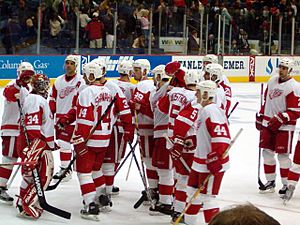
In 2005–06, Mike Babcock became the new head coach. The Red Wings won the Presidents' Trophy for the best regular season record. However, they were upset in the first round of the playoffs. After this season, Steve Yzerman retired. He was the longest-serving team captain in NHL history.
The "Euro-Twins" Era (2006–2017)
The 2006–07 season began with Nicklas Lidstrom as the new captain. The team retired Yzerman's number 19 jersey. Detroit finished first in the Western Conference but lost in the conference finals.
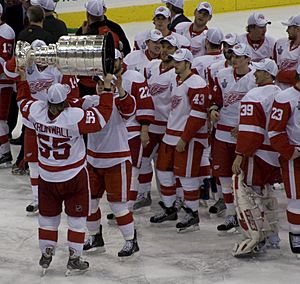
In the 2007–08 season, Henrik Zetterberg set a club record by scoring points in the first 17 games. The Red Wings had a great season and made it to the Stanley Cup Final. They won the Stanley Cup against the Pittsburgh Penguins. This was their fourth Cup in 11 years and their 11th overall. Zetterberg scored the winning goal and was named playoff MVP. Lidstrom became the first non-North American player to captain a Stanley Cup-winning team.
In 2009, the Red Wings played the Chicago Blackhawks in the second NHL Winter Classic outdoors at Wrigley Field. They won the game. They reached the Finals again in 2009, facing the Penguins once more. This time, the Penguins won in seven games.
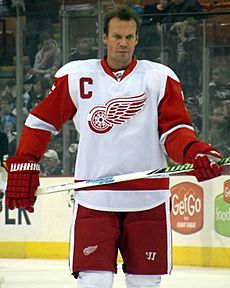
The Red Wings continued to make the playoffs. In the 2010–11 season, they won their division. They swept the Phoenix Coyotes in the first round. In the second round, they came back from being down 3–0 in the series to force a Game 7, but they lost.
In 2011, the Red Wings set an NHL record by winning 23 consecutive home games. They also extended their playoff streak to 21 seasons. On May 31, 2012, Nicklas Lidstrom retired.
Henrik Zetterberg was named the new team captain. The Red Wings continued their playoff streak, making it 22 seasons in a row in 2012–13. They won a tough seven-game series against the Anaheim Ducks. They then faced the top-seeded Chicago Blackhawks and took a 3–1 series lead, but the Blackhawks came back to win in seven games.
In the 2013–14 season, the Red Wings moved to the Atlantic Division in the Eastern Conference. This meant they played more games against teams in their time zone. They clinched their 23rd consecutive playoff appearance but lost in the first round.
The Red Wings extended their playoff streak to 24 seasons in 2015 and 25 seasons in 2016. However, they lost in the first round both times. In 2016, Pavel Datsyuk left the team to return to Russia. On February 10, 2017, team owner Mike Ilitch passed away. The Red Wings' amazing playoff streak ended after 25 seasons in the 2016–17 season. They played their last game at Joe Louis Arena on April 9, 2017.
Little Caesars Arena and Rebuilding (2017–Present)
The Red Wings played their first regular season game at Little Caesars Arena on October 5, 2017. They won the game 4–2. The team missed the playoffs for the second season in a row in 2017–18. This was the first time since the early 1980s they missed the playoffs in back-to-back years. They also missed the playoffs in 2018–19.
On April 19, 2019, Steve Yzerman returned to the team as general manager. The Red Wings finished the 2019–20 season with the worst record in the NHL. The season was stopped early due to the COVID-19 pandemic.
Dylan Larkin was named the Red Wings captain on January 13, 2021, taking over from Henrik Zetterberg. The Red Wings missed the playoffs for the fifth, sixth, seventh, and eighth consecutive seasons. On April 30, 2022, Jeff Blashill was fired as head coach. Derek Lalonde was hired as the new head coach on June 30, 2022.
On December 26, 2024, after a slow start to the 2024–25 season, the Red Wings fired coach Lalonde. Todd McLellan was hired as their new head coach. The Red Wings were eliminated from playoff contention for the ninth consecutive season on April 12, 2025. This is now the longest playoff drought in the team's history.
Team Information
Logo and Uniforms
The Red Wings' jerseys have looked mostly the same since the 1930s. They are either red or white with matching stripes. The biggest change was replacing the word Detroit with the "winged wheel" logo in 1932. This "winged wheel" logo was voted the second best in the league by The Hockey News in 2008.
The Red Wings rarely use different alternate jerseys. They did wear special throwback jerseys for the league's 75th anniversary in 1991–92. They also wore special "retro" jerseys for the 2009 Winter Classic and the 2014 Winter Classic. These were based on the uniforms worn by the Detroit Cougars in their first season.
For the 2016 Stadium Series game, they wore a unique red jersey with a diagonal white stripe and a stylized red "D" on the front. In 2016–17, they wore a patch with Gordie Howe's number 9 to honor him after he passed away.
For the 2020–21 and 2022–23 seasons, the Red Wings wore special "Reverse Retro" alternate jerseys. These jerseys used older designs with new colors, like silver stripes to celebrate their Stanley Cup wins.
In 2017, the Red Wings' logo was used by a white supremacist group. The Red Wings quickly spoke out against this and threatened legal action.
Fan Traditions
One famous Red Wings tradition during playoff games is the "Legend of the Octopus." Fans throw an octopus onto the ice for good luck. This started in the 1952 playoffs. A local fish market owner threw an octopus onto the ice. The eight legs of the octopus represented the eight wins needed to win the Stanley Cup back then. The Red Wings went on to win the Cup that year.
The NHL has tried to stop this tradition at times, but it still continues. Al Sobotka, the former head ice manager, used to swing the octopuses over his head when he removed them from the ice. The NHL later restricted this, but now it's allowed at the Zamboni entrance.
Near the end of games that the Red Wings are winning, especially in the playoffs, fans often sing along to Journey's song "Don't Stop Believin'." The arena plays the song, and the crowd sings the line "Born and raised in South Detroit."
Broadcasters
The Red Wings' main radio station is WXYT-FM 97.1. Their local television games are shown on FanDuel Sports Network Detroit.
Season-by-Season Record
This is a partial list of the last five seasons completed by the Detroit Red Wings. Note: GP = Games played, W = Wins, L = Losses, OTL = Overtime losses, Pts = Points
| Season | GP | W | L | OTL | Pts | Finish | Playoffs |
| 2020–21 | 56 | 19 | 27 | 10 | 48 | 7th, Central | Did not qualify |
| 2021–22 | 82 | 32 | 40 | 10 | 74 | 6th, Atlantic | Did not qualify |
| 2022–23 | 82 | 35 | 37 | 10 | 80 | 7th, Atlantic | Did not qualify |
| 2023–24 | 82 | 41 | 32 | 9 | 91 | 5th, Atlantic | Did not qualify |
| 2024–25 | 82 | 39 | 35 | 8 | 86 | 6th, Atlantic | Did not qualify |
Players and Personnel
Hockey Hall of Fame Members
Many players and builders from the Detroit Red Wings have been inducted into the Hockey Hall of Fame. This includes 68 former players and 12 people who helped build the sport, like coaches and owners.
Players
- Sid Abel
- Daniel Alfredsson
- Alex Delvecchio
- Marcel Dionne
- Sergei Fedorov
- Viacheslav Fetisov
- Glenn Hall
- Dominik Hasek
- Gordie Howe
- Mark Howe
- Syd Howe
- Brett Hull
- Red Kelly
- Igor Larionov
- Nicklas Lidstrom
- Ted Lindsay
- Frank Mahovlich
- Larry Murphy
- Adam Oates
- Brad Park
- Luc Robitaille
- Terry Sawchuk
- Brendan Shanahan
- Darryl Sittler
- Steve Yzerman
Builders
- Jack Adams
- Scotty Bowman
- Ken Holland
- Mike Ilitch
- Tommy Ivan
- Bruce Norris
- James E. Norris
Retired Numbers
The Red Wings have retired eight jersey numbers to honor their greatest players.
| No. | Player | Position | Years Played | Number Retired |
|---|---|---|---|---|
| 1 | Terry Sawchuk | G | 1949–1955, 1957–1964, 1968–1969 | March 6, 1994 |
| 4 | Red Kelly | D | 1947–1960 | February 1, 2019 |
| 5 | Nicklas Lidstrom | D | 1991–2012 | March 6, 2014 |
| 7 | Ted Lindsay | LW | 1944–1957, 1964–1965 | November 10, 1991 |
| 9 | Gordie Howe | RW | 1946–1971 | March 12, 1972 |
| 10 | Alex Delvecchio | C | 1950–1974 | November 10, 1991 |
| 12 | Sid Abel | C | 1938–1943, 1945–1952 | April 29, 1995 |
| 19 | Steve Yzerman | C | 1983–2006 | January 2, 2007 |
The first number retired was No. 9 for Gordie Howe in 1972. Howe won many awards and four Stanley Cups with the team. In 2007, Steve Yzerman's No. 19 was retired. Yzerman was the team captain for 19 seasons, an NHL record, and won three Stanley Cups. The most recent retired number is Red Kelly's No. 4 in 2019. Kelly won four Stanley Cups with the Red Wings.
The numbers 6 (for Larry Aurie) and 16 (for Vladimir Konstantinov) are also not used by any players, but they are not officially retired. The NHL also retired number 99 for Wayne Gretzky across the entire league.
Team Captains
Here are the players who have been captain for the Detroit franchise:
- Art Duncan, 1926–1927
- Reg Noble, 1927–1930
- George Hay, 1930–1931
- Carson Cooper, 1931–1932
- Larry Aurie, 1932–1933
- Herbie Lewis, 1933–1934
- Ebbie Goodfellow, 1934–1935, 1938–1941
- Doug Young, 1935–1938
- Ebbie Goodfellow and Syd Howe, 1941–1942
- Sid Abel, 1942–1943
- Mud Bruneteau and Flash Hollett, 1943–1944
- Flash Hollett, 1944–1945
- Flash Hollett and Sid Abel, 1945–1946
- Sid Abel, 1946–1952
- Ted Lindsay, 1952–1956
- Red Kelly, 1956–1958
- Gordie Howe, 1958–1962
- Alex Delvecchio, 1962–1973
- Alex Delvecchio, Nick Libett, Red Berenson, Gary Bergman, Ted Harris, Mickey Redmond, and Larry Johnston, 1973–1974
- Marcel Dionne, 1974–1975
- Danny Grant and Terry Harper, 1975–1976
- Danny Grant and Dennis Polonich, 1976–1977
- Dan Maloney and Dennis Hextall, 1977–1978
- Dennis Hextall, Nick Libett, and Paul Woods, 1978–1979
- Dale McCourt, 1979–1980
- Errol Thompson and Reed Larson, 1980–1981
- Reed Larson, 1981–1982
- Danny Gare, 1982–1986
- Steve Yzerman, 1986–2006
- Nicklas Lidstrom, 2006–2012
- Henrik Zetterberg, 2013–2018
- Dylan Larkin, 2021–present
Franchise Records
All-Time Leading Scorers
These players are the top ten in Red Wings history for points, goals, and assists.
- * – current Red Wings player
Note: Pos = Position; GP = Games played; G = Goals; A = Assists; Pts = Points; P/G = Points per game
|
|
|
All-Time Leading Goaltenders
These goalies are the top ten in Red Wings history for wins.
- * – current Red Wings player
Note: GP = Games played; W = Wins; L = Losses; T = Ties; OT = Overtime losses; SO = Shutouts; GAA = Goals against average
|
|
Individual Records
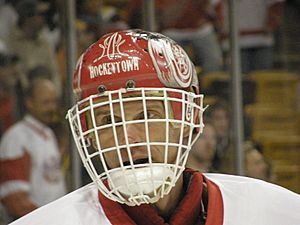
- Most goals in a season: 65, Steve Yzerman (1988–89)
- Most assists in a season: 90, Steve Yzerman (1988–89)
- Most points in a season: 155, Steve Yzerman (1988–89)
- Most penalty minutes in a season: 398, Bob Probert (1987–88)
- Most points in a season by a defenseman: 80, Nicklas Lidstrom (2005–06)
- Most points in a season by a rookie: 87, Steve Yzerman (1983–84)
- Most wins in a season by a goalie: 44, Terry Sawchuk (1950–51 and 1951–52)
- Most shutouts in a season by a goalie: 12, Terry Sawchuk (1951–52, 1953–54, and 1954–55) and Glenn Hall (1955–56)
- Most shutouts in a single postseason: 6, Dominik Hasek (2002)
- Longest home win streak in NHL history: 23 games (November 5, 2011, to February 19, 2012)
- Most wins in a season in NHL history: 62 (1995–96)
Images for kids
See also
 In Spanish: Detroit Red Wings para niños
In Spanish: Detroit Red Wings para niños
 | Aurelia Browder |
 | Nannie Helen Burroughs |
 | Michelle Alexander |


